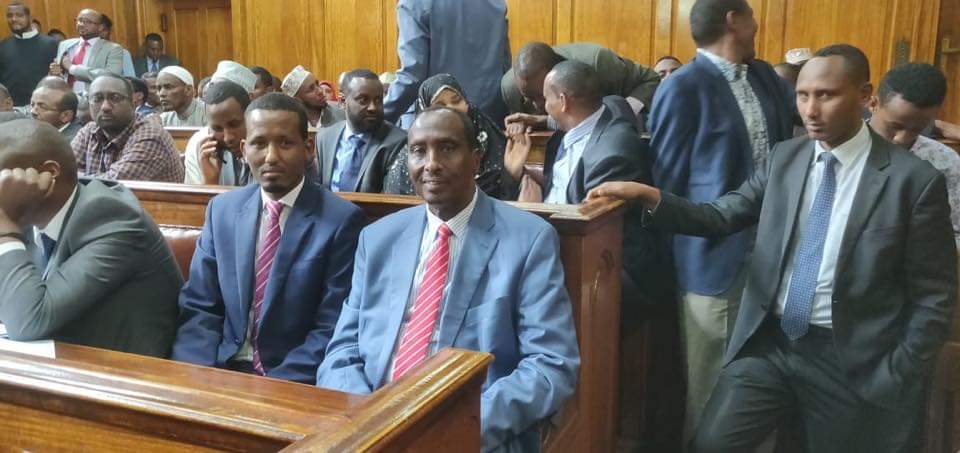Published
5 years agoon
By
Kulan Post

Wajir governor Mohamed Abdi (sitted right) with the Deputy Governor, Ahmed Ali during the hearing at the Supreme Court on Wednesday. (Courtesy)
NAIROBI—At a fully packed courtroom at the Supreme Court building on Wednesday morning, the atmosphere was immense with a palpable sense of tention.
Senior Counsels Ahmednassir Ahmed and James Orengo appearing for Ahmed Abdullahi and Ahmed Muhumed respectively were set for a battle against Prof Tom Ojienda and Fred Ngatia for the governor of Wajir County, Mohamed Abdi.
Ahmednassir clashed with Justice Njoki Ndung’u over who to address in the bench. He was appealing to the court to dismiss a petition by founder and Vice Chancellor, Badru Katerega. Justice Maraga later dismissed the affidavit, saying it was filed after the application for cross-examination was quashed.
“Mr Ahmednassir, why don’t you address Justice Issac Lenaola in particular because he is the one who asked you the question instead of addressing the Chief Justice David Maraga because he (Lenaola) asked you the question?” Justice Ndung’u to Ahmednassir.
“I’m not breaking any law nor breaching any protocol. Hold on Justice Ndung’u: I’m addressing the chief Justice Maraga who is the presiding judge and I have no opologies to make,” he said, prompting a smile from Justice Maraga.
The legal team representing the respondents urgued that the apex court was trying a case previously handled by two lower courts—High Court and Appeals Court.
“You are listening to an appeal from the Appeals Court…This court has elevated the issue of degree to be a constitutional matter,” Ahmednassir said.
Counsel Fred Ngatia responded that, “Ahmednassir is angry because the (Supreme) court rejected his pleas for cross-examination.”
“This is what we call sham affidavit doctrine,” Ahmednassir continued.
He added, “(Wajir governor) has a proof of his lack of degree at the Parliament hansard,”
Ngatia responded that, “Wajir governor did not graduate by that time. He was completing his diploma course while continuing with his bachelor in Business Administration.”
An affidavit by Junice Openzo, who claimed Mohamed Abdi was his student, was contested during the hearing.
In his affidavit, Wajir governor Mohamed Abdi said he cleared on October 2011 and graduated on January 2012.
“In his appointment letter, Openzo was employed on April of 2011. The question is, when did he teach him (Wajir governor) in class? This a conflicting affidavit,” James Orengo said.
“This affidavit is useless. He should bring his cats and exam papers instead of presenting an affidavit by a fake lecturer, ” Ahmednassir added.
Lawyers for the respondents also urgued that the only remedy for conflicting affidavits is cross-quizzing the people in the affidavits.
“When we have two conflicting affidavits, the only way to solve it is through cross-examination,” Ahmednassir urgued.
It was challenged by Ngatia who said push for cross examination was not necessary.
The respondents presented a letter from the Ugandan interior ministry denying entry of Mohamed Abdi into Uganda.
Ahmednassir said “… And we are trying such an absurd case here, but we have to.”
He added, “If this court will rule that the governor has a degree when all evidence show he could not have obtained it in the period he claims he acquired, then this court will confer a degree on a person who did not attend class at the Kampala University.”
“There are evidences that are cleverly made, but have no basis in fact and truth, ” Orengo said, adding that the “Petitioner has not convinced the court why he has to be retained as Wajir governor. “
A letter of admission, he noted, is not evidence of attaining degree.
“It is our fear that this court will confer a degree on someome who has not attended class,” Orengo expressed.
Ngatia urgued that the provision of degree as requirement for a governor was done away by the National Assembly, adding that “Education is a process and appearing on the graduation list is not necessarily an indication that someone went to class.”
James Orengo, while speaking to Kulan Post after the session, said the exemption of degree as a provision is exclusive to the members of the county assembly.
The court of appeal, Ngatia said, misrepresented the truth and “We hope this court will serve the people of Wajir the victory that IEBC accorded them in 2017.”
The court was adjourned at 2:30 pm with a direction that it will serve judgement date by way of notice.


Muslim leaders slam Supreme Court for allowing registration of LGBTQ as community


Supreme Court judges reject review of Hijab case verdict, want High Court to try afresh


Sh 317 million Wajir funds cannot be accounted for, Auditor-General report indicates


Wajir top official denies EACC survey that placed county top of corruption index


Bribe demands highest in Wajir County for the third year running, EACC report says


Dissecting the Supreme Court judgment on Wajir petition
